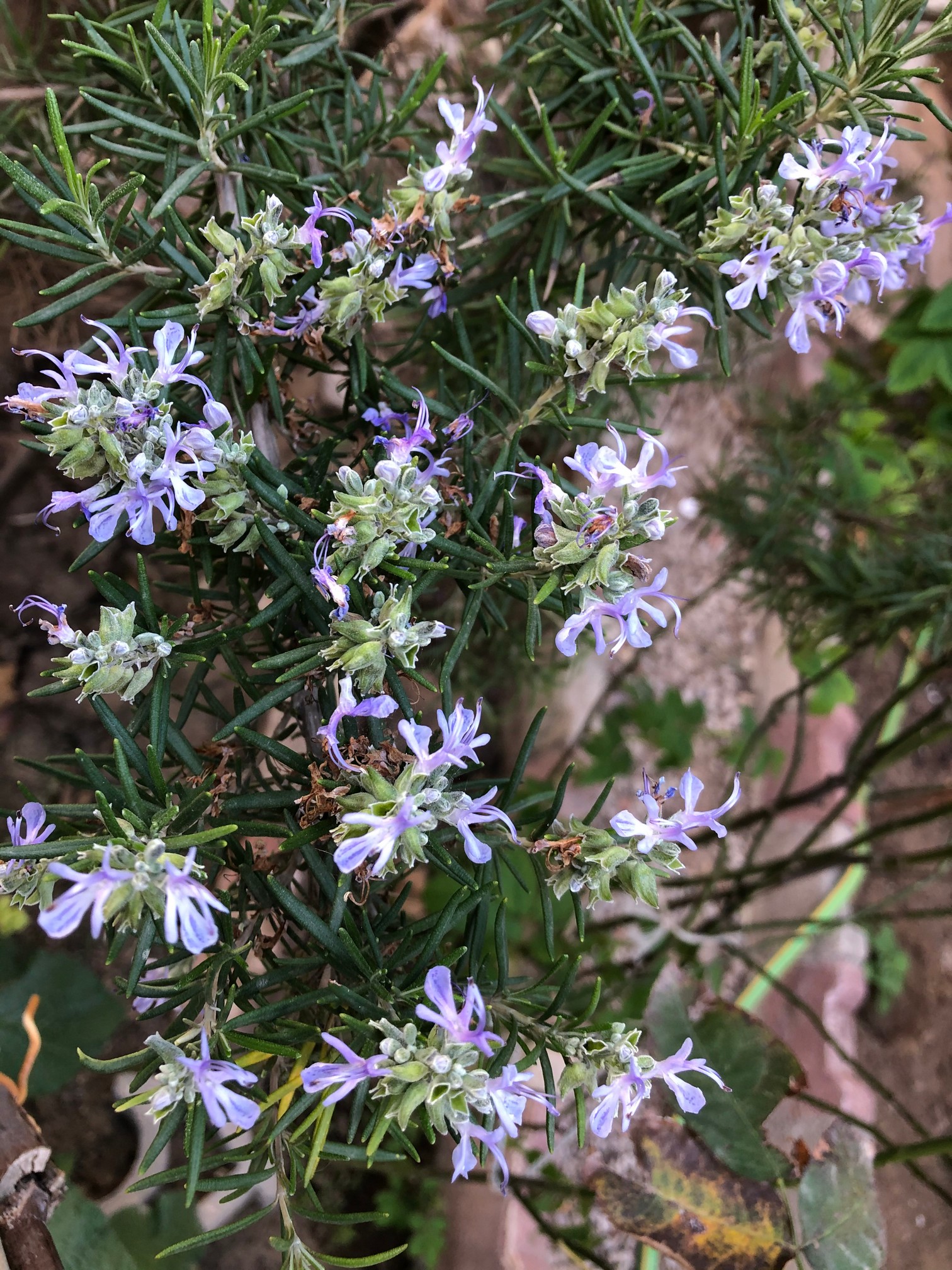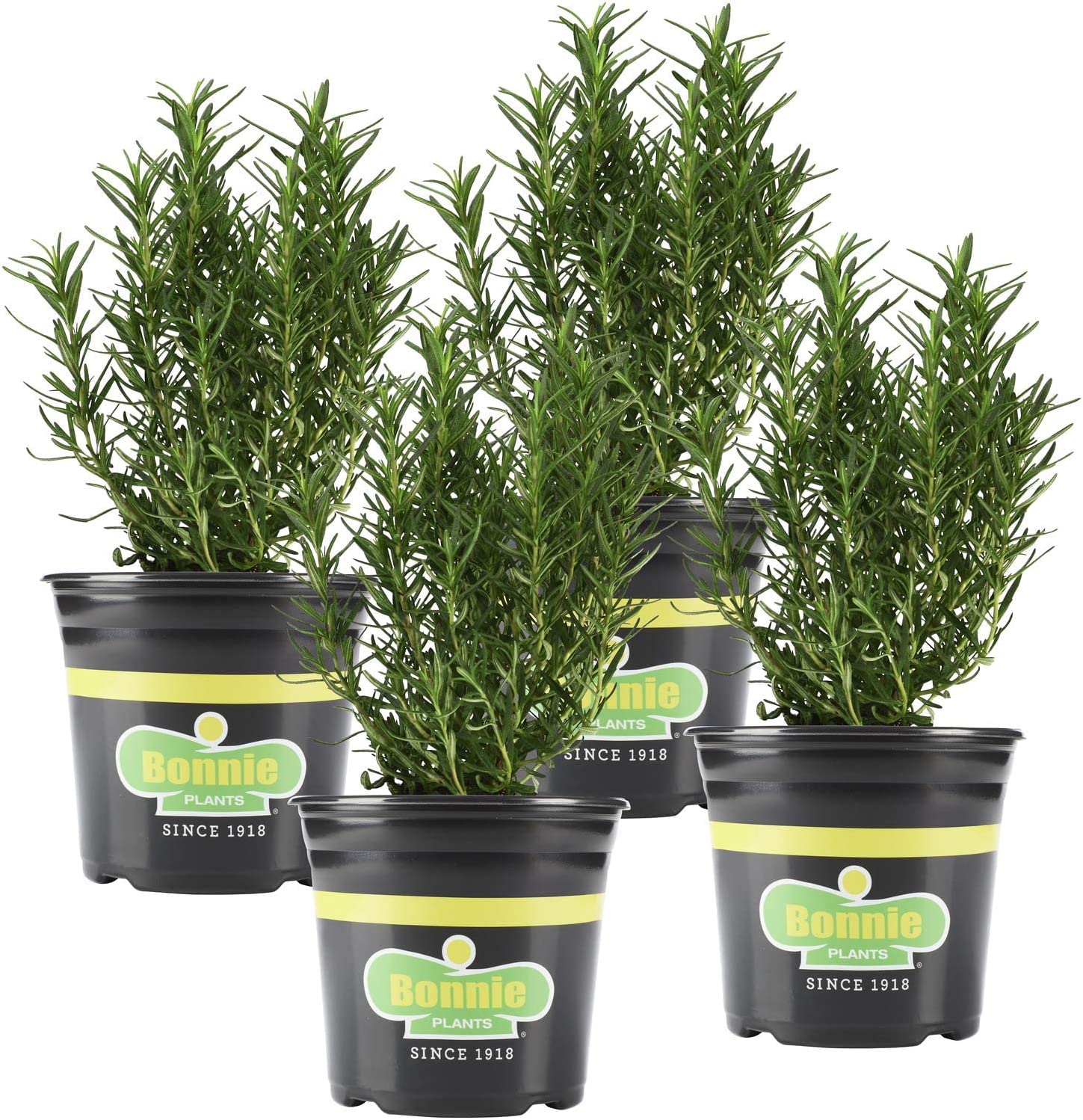The name rosemary is derived from the Latin "rosmarinus officinalis"; "ros", meaning dew, and "marinus", meaning sea. This derivation probably stemming from the fact that the rosemary bush is native to the seaside regions of North Africa and the Mediterranean. It is one of the most common aromatic wild plants of the Mediterranean landscape, especially in rocky limestone hillsides adjoining the seaside. The ancient legend say that rosemary grows "where one can hear the sea". One of its common names, "dew of the sea", is a likely reference to the shimmering blue flowers that cover the rosemary bush in mid-winter. Other of its common names include Incensier, Sea Dew, Ros Maris, Rosmarine, Rosemarie. Rosemary is also sometimes called “anthos,” from the ancient Greek word for “flower.” Throughout the histories of many cultures, rosemary has been associated with improving memory. It was worn as a garland by Greeks as a way to clear the head during examinations and in the Middle Ages it was worn by brides as a symbol of remembrance, fidelity, happiness and love. According to Greek mythology, the goddess of love Aphrodite was draped in rosemary when she rose from the sea. In Christianity, it was said that when the Virgin Mary lied down on a bed of rosemary, her blue cloak touched the flowers, which made them turn blue. It became known as ‘The Rose of Mary’. Rosemary was thought to be a love charm during the Middle Ages. During wedding ceremonies, the bride would wear a rosemary headpiece, while the groom wore a rosemary sprig on his clothes. Students in Ancient Greece wore garlands of rosemary around their necks, or braided it into their hair to improve their memory during exams. Others would place it in their pillow the night before to enhance memory during sleep. The Ancients were well acquainted with the shrub, which had a reputation for strengthening the memory. On this account it became the emblem of fidelity for lovers. It holds a special position among herbs from the symbolism attached to it. Rosemary has long held a prominent role in the wedding ceremony. Used in weddings to help one remember the wedding vows, the bride and groom might dip rosemary in their wine cups to toast each other. Dried rosemary has been laid in the bed linen to ensure faithfulness, and a bride who gave her groom a sprig of rosemary to hold on their wedding night would ensure that he remain faithful. In the Middle Ages, the more elegant couples gave rosemary as a wedding favor. Sprigs were often dipped in gold and tied with a beautiful ribbon, this to symbolize that though the couple were starting a new life, they would always remember their friends and family. Not only was it used at weddings, but also at funerals, Rosemary is still today regarded as the funeral flower signifying respect and remembrance for the departed. During the Middle Ages, rosemary was spread on the floor at midnight on Christmas Eve so as people walked on it, the fragrance would fill the air; this in the belief that those who smelled rosemary on Christmas Eve would have a year of health and happiness. Thus, started the long tradition of rosemary in Christmas wreaths and other holiday decorations. Rosemary was believed to grow only in the gardens of the righteous and protected one from evil spirits. Today, as in the past, rosemary continues to capture the attention of those who seek its usefulness in the preservation of health and beauty.
(Shortcode: {tocify} $title={Table of Contents}
Brought to Britain with the Roman armies, rosemary over the centuries has spread its influence through Europe and eventually to the New World. In addition to the widespread belief in its cosmetic benefit, rosemary is mentioned throughout the anals of Europeon history for its properties of purification, and its healing powers.
Rosemary
Rosemary is the common name for a woody, perennial herbaceous plant, Rosmarinus officinalis, characterized by fragrant, evergreen needle-like leaves and tiny, clustered, light blue, violet, pink, or white flowers. The flowers appear in winter or spring. They are tiny, two-lipped, and grow in a cluster of five to seven blossoms each from a pair of short, opposite spikes that alternate along the sides of the stalk. Two seeds are borne in each flower.
The name also refers specifically to the aromatic leaves of this plant, which are used as a herb for seasoning various dishes and used in perfumes. A member of the mint family, Lamiaceae, rosemary is native to the Mediterranean region.
$ads={1}
Rosemary is widely cultivated for culinary and medicinal use. It is used in a wide variety of dishes, including as a meat seasoning, to add flavor to soups, vegetables, salads, dressings, and stuffing's.
The leaves are evergreen, simple, sessile, and opposite. They are narrow leaves, about 2 to 4 centimeters long and 2 to 5 millimeters broad. The leaves are dark green above and pale green on the underside, with a distinctive mid-vein.
Rosemary varieties
There are many varieties of rosemary:
Rosmarinus Officinalis: This is the traditional variety; it grows to about 1m tall.
Rosemary Capri: This is a dwarf variety that only grows to 10cm tall ,ideal for smaller gardens or containers.
Rosemary Genes Gold: This type is compact and has yellow edged leaves.
- As a circulatory tonic, rosemary is invaluable for all cases of poor circulation, as well as for aches and pains that come with a cold. Long-term use of rosemary tea will improve a whole range of symptoms in those with poor circulations.
$ads={2}
- Rosemary has a special affinity for the head. It eases headaches and migraines and can be combined with chamomile for headaches.
Rosemary oil is one of the most popular essential oils for its wide array of health benefits. It has become more important and popular over the years as more of its benefits are now known, including its ability to stimulate hair growth, boost mental activity, relieve respiratory problems and reduce pain.
This essential oil is a disinfectant and is often used as a mouthwash, helping remove bad breath. By removing oral bacteria, rosemary oil can prevent cavities, plaque buildup, and other dental issues. Smelling rosemary oil actually decreased the levels of the stress hormone, cortisol, in the saliva. Excess cortisol can cause oxidative stress, weight gain, high blood pressure, cholesterol and heart disease. Regular use of rosemary oil helps to stimulate follicles, making hair grow longer and stronger. Rosemary oil is often used for indigestion, relieving flatulence, stomach cramps, constipation, and bloating.
Safety Information
Pin for later!








